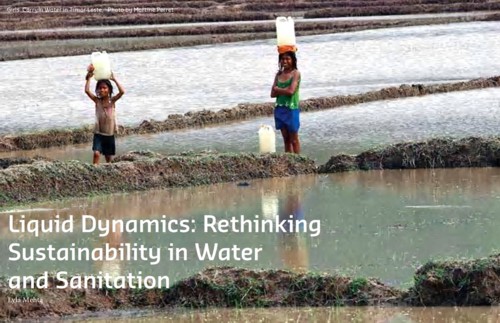/topics/sustainability
Sustainability
Alternative National Water Policy: Ramaswamy Iyer's response to comments by Rahul Banerjee and Chetan Pandit in EPW
Posted on 04 Feb, 2012 06:44 PMGuest post: Ramaswamy R Iyer
This is in response to the comments made by Rahul Banerjee (“National Water Policy”, 13 August 2011) and Chetan Pandit (“Alternative National Water Policy: A Critique”, 10 September 2011) on my article “National Water Policy: An Alternative Draft for Consideration” (25 June 2011).
Epigrammatic Style
Mining poisons South Goa waters: The case of the Salaulim reservoir shown in a film
Posted on 04 Feb, 2012 05:05 PMContent and Media Courtesy: Video Volunteers
River basin planning for Ganga : Lessons from Murray-Darling Basin Authority
Posted on 02 Feb, 2012 09:15 PMThis interactive session with NGOs working on water and river issues was held in continuation of the “Living rivers, dying rivers” series at the request of AusAid. The meeting was chaired by Prof. Ramaswamy R. Iyer, Honorary Professor, Centre for Policy Research and an author of books and articles on water while the lead speaker Dr.
Community monitoring in water and sanitation projects - A facilitators manual by PRIA
Posted on 02 Feb, 2012 11:59 AMThis manual is based on the work that PRIA was involved in that included facilitating the process of social development and monitoring, and for guiding the process of developing models for community monitoring linked to community action, for child survival and development in six project sites in India.
This manual is divided into three key sections:
Planning as commoning - Transformation of a Bangalore lake - Paper published in the EPW
Posted on 02 Feb, 2012 11:30 AMThis paper published in the Economic and Political Weekly argues that the transformation of human settlements over time can affect the relationship between communities and commons when, for example, social geographies change from rural to urban, or from traditional systems of management to modern bureaucratic systems.
Draft of the National Water Policy 2012 released by the Ministry of Water Resources (MoWR) on 31st January 2012 invites comments from the general public till 29th Feb 2012
Posted on 01 Feb, 2012 02:01 PMA section of the water sector practitioners and experts, have been engaged in the process, and a summary of the discussions so far, is available here.
Strengthening quality monitoring to provide safe drinking water: Common treatments and analyses
Posted on 30 Jan, 2012 10:59 AMAuthor : Ravi Savant
Contextualising urban water supply in a changing environment: India Urban Conference, November 17-20 2011
Posted on 30 Jan, 2012 09:21 AMIt aimed to set the challenges faced by urban planners in the current economic, socio-political, and ecological landscape. This would enable informed and negotiated choices on urban development. The stated objectives of the conference are as follows:
Saving some last remaining free flowing rivers
Posted on 24 Jan, 2012 06:38 AMGuest post by: Parineeta Dandekar
Liquid Dynamics: Rethinking sustainability in water and sanitation
Posted on 20 Jan, 2012 06:55 PMThis paper begins with the slow rate of progress in achieving the millennium development goals of environmental sustainability, especially in the areas of water and sanitation. This is due to the disconnect between the global rhetoric (which often focuses on water as an economic good) and social realities (such as the cultural attitudes towards water)





